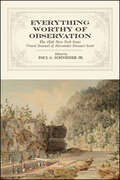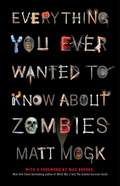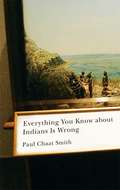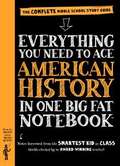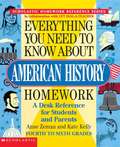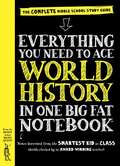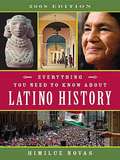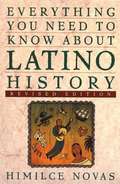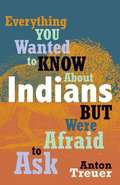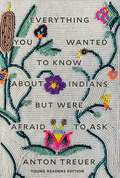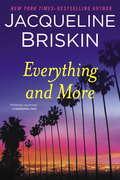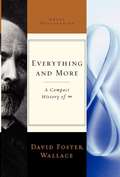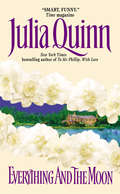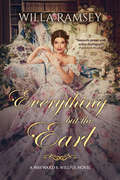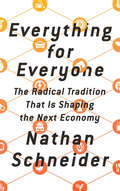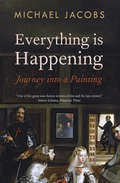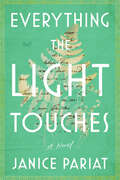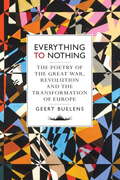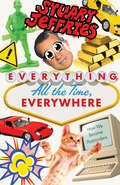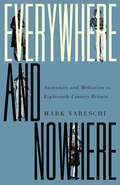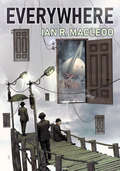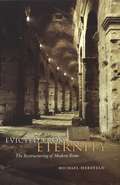- Table View
- List View
Everything Worthy of Observation: The 1826 New York State Travel Journal of Alexander Stewart Scott (Excelsior Editions)
by Paul G. Schneider Jr.Finalist for the 2019 Foreword INDIES Book of the Year Award in the History categoryIn the pre-dawn of August 2, 1826, Alexander Stewart Scott stepped aboard the steamboat Chambly in Quebec City, Canada. He was beginning a journey that not only took him across New York State but also ultimately changed his view of America and her people. A keen observer, the twenty-one-year-old meticulously recorded his travel experiences, observations about the people he encountered, impressions of things he saw, and reactions to events he witnessed.This firsthand account immerses the reader in the world of early-nineteenth-century life in both New York and Lower Canada. Whether enduring the choking dust raised by a stagecoach, the frustration and delays caused by bad roads, or the wonders and occasional dangers of packet boat travel on the newly completed Erie Canal, all are vividly brought to life by Scott's pen. This journal also offers a unique blend of travel and domestic insights. With close family members living in both St. John's, Quebec, Canada, and Palmyra, New York, his travels were supplemented by long stays in these communities, offering readers comparative glimpses into the daily lives and activities in both countries. Gregarious, funny, and inquisitive, Scott missed nothing of what he thought worthy of observation.
Everything You Ever Wanted to Know About Zombies
by Matt MogkThe most comprehensive zombie handbook ever published--with a foreword by Max Brooks! In one indispensable volume, Matt Mogk busts popular myths and answers all your raging questions about the living dead.*Q. How can I increase my chances of survival? A. One simple step is to keep away from other people. Without people there can be no zombies. Q. What is the connection between the Voodoo zombie and the flesh-eating zombie of popular culture? A. Other than a shared name, absolutely nothing. Q. Will zombies actually eat me, or will they just bite and chew? A. Research suggests the neuromuscular activity required for swallowing may be too complex for a zombie. Q. Will we see any warning signs before the dead rise? A. Unfortunately, entire populations could be infected with the zombie sickness before anyone even knows there's a problem. Q. How come Zombie Awareness Month is in May and not October? A. Unlike witches and vampires, zombies are not otherworldly creatures. They are made of flesh and blood. Don't forget to wear your gray ribbon. * Many more questions about zombies--including why not all of them are undead--are answered inside the book.
Everything You Ever Wanted to Know About Zombies
by Matt MogkTHE MOST COMPREHENSIVE ZOMBIE HANDBOOK EVER PUBLISHED In one indispensable volume, Matt Mogk, founder and head of the Zombie Research Society, busts popular myths and answers all your raging questions about the living dead.* Q. How can I increase my chances of survival? A. One simple step is to keep away from other people. Without people there can be no zombies. Q. What is the connection between the Voodoo zombie and the flesh-eating zombie of popular culture? A. Other than a shared name, absolutely nothing. Q. Will zombies actually eat me, or will they just bite and chew? A. Research suggests the neuromuscular activity required for swallowing may be too complex for a zombie. Q. Will we see any warning signs before the dead rise? A. Unfortunately, entire populations could be infected with the zombie sickness before anyone even knows there's a problem. Q. How come Zombie Awareness Month is in May and not October? A. Unlike witches and vampires, zombies are not otherworldly creatures. They are made of flesh and blood. Don't forget to wear your gray ribbon. * Many more questions about zombies--including why not all of them are undead--are answered inside the book.
Everything You Know About Indians Is Wrong (Indigenous Americas)
by Paul Chaat SmithIn this sweeping work of memoir and commentary, leading cultural critic Paul Chaat Smith illustrates with dry wit and brutal honesty the contradictions of life in “the Indian business.” <p><p> Raised in suburban Maryland and Oklahoma, Smith dove head first into the political radicalism of the 1970s, working with the American Indian Movement until it dissolved into dysfunction and infighting. Afterward he lived in New York, the city of choice for political exiles, and eventually arrived in Washington, D.C., at the newly minted National Museum of the American Indian (“a bad idea whose time has come”) as a curator. In his journey from fighting activist to federal employee, Smith tells us he has discovered at least two things: there is no one true representation of the American Indian experience, and even the best of intentions sometimes ends in catastrophe. <p> Everything You Know about Indians Is Wrong is a highly entertaining and, at times, searing critique of the deeply disputed role of American Indians in the United States. In “A Place Called Irony,” Smith whizzes through his early life, showing us the ironic pop culture signposts that marked this Native American's coming of age in suburbia: “We would order Chinese food and slap a favorite video into the machine—the Grammy Awards or a Reagan press conference—and argue about Cyndi Lauper or who should coach the Knicks.” In “Lost in Translation,” Smith explores why American Indians are so often misunderstood and misrepresented in today's media: “We're lousy television.” In “Every Picture Tells a Story,” Smith remembers his Comanche grandfather as he muses on the images of American Indians as “a half-remembered presence, both comforting and dangerous, lurking just below the surface.” <p> Smith walks this tightrope between comforting and dangerous, offering unrepentant skepticism and, ultimately, empathy. “This book is called Everything You Know about Indians Is Wrong, but it's a book title, folks, not to be taken literally. Of course I don't mean everything, just most things. And 'you' really means we, as in all of us.”
Everything You Need To Ace American History In One Big Fat Notebook
by Philip BiglerEverything You Need to Ace American History covers Native Americans to the war in Iraq. There are units on Colonial America; the Revolutionary War and the founding of a new nation; Jefferson and the expansion west; the Civil War and Reconstruction; and all of the notable events of the 20th century--World Wars, the Depression, the Civil Rights movement, and much more. The BIG FAT NOTEBOOK(tm) series is built on a simple and irresistible conceit--borrowing the notes from the smartest kid in class. There are five books in all, and each is the only book you need for each main subject taught in middle school: Math, Science, American History, English Language Arts, and World History. Inside the reader will find every subject's key concepts, easily digested and summarized: Critical ideas highlighted in neon colors. Definitions explained. Doodles that illuminate tricky concepts in marker. Mnemonics for memorable shortcuts. And quizzes to recap it all. The BIG FAT NOTEBOOKS meet Common Core State Standards, Next Generation Science Standards, and state history standards, and are vetted by National and State Teacher of the Year Award-winning teachers. They make learning fun, and are the perfect next step for every kid who grew up on Brain Quest.
Everything You Need To Know About American History Homework
by Kate Kelly Anne Zeman Anne M. ZemanProvides fourth to sixth grade students and their parents with information they need to complete American history assignments. Includes information about such topics as the Declaration of Independence, the Westward expansion, the Transcontinental Railroad, important inventions, and much more.
Everything You Need to Ace World History in One Big Fat Notebook: The Complete Middle School Study Guide (Big Fat Notebooks)
by Ximena Vengoechea Michael LindbladEverything You Need to Ace World History . . . kicks off with the Paleolithic Era and transports the reader to ancient civilizations--from Africa and beyond; the middle ages across the world; the Renaissance; the age of exploration and colonialism, revolutions, and the modern world and the wars and movements that shaped it. <p><p> The BIG FAT NOTEBOOKS meet Common Core State Standards, Next Generation Science Standards, and state history standards, and are vetted by National and State Teacher of the Year Award–winning teachers. They make learning fun, and are the perfect next step for every kid who grew up on Brain Quest.
Everything You Need to Know About Latino History
by Himilce NovasThe popular primer to Latino life and culture?updated for 2008 Latinos represent the fastest-growing ethnic population in the United States. In an accessible and entertaining question-and-answer format, this completely revised 2008 edition provides the most current perspective on Latino history in the making, including: ? New Mexico governor Bill Richardson?s announced candidacy for the 2008 presidential election ? Ugly Betty?the hit ABC TV show based on the Latino telenovela phenomenon ? The number of Latino players in Major League baseball surpassing the 25 percent mark ? Immigration legislation and the battle over the Mexican border ? The state of Castro?s health and what it means for Cuba More than ever, this concise yet comprehensive reference guide is the ideal introduction to the vast and varied history and culture of this multifaceted ethnic group. .
Everything You Need to Know about Latino History
by Himilce NovasIf you eat fajitas, listen to Selena, have studied the Spanish-American War, read Julia Alvarez, visited Miami, or seen Charlie Sheen in a movie, you're probably aware that Latino culture is an integral part of American life. But most Americans do not know much about Latino history, or realize the impact it has on the politics, economy, and culture of American life. <P>"Everything You Need to Know About Latino History" covers the contributions of Spaniards, Mexicans, Puerto Ricans, Cubans, Dominicans, and Central and South Americans whose cultures have given us everything from chocolate to chili peppers, from mambo to machismo, and from Desi Arnaz to Oscar Hijuelos. Presented in a question and answer format, this revised edition includes new information on Central and South Americans, the largest group of new Latino immigrants, the passing of Proposition 187 in California, and how Latino women are playing a larger role in politics and the arts. This accessible reference book is perfect for boththe history buff and the curious reader who want to learn more about Latino American history.
Everything You Wanted To Know About Indians But Were Afraid To Ask
by Anton TreuerIn matter-of-fact responses to over 120 questions, both thoughtful and outrageous, modern and historical, Ojibwe scholar and cultural preservationist Anton Treuer gives a frank, funny, and sometimes personal tour of what's up with Indians, anyway. --What is the real story of Thanksgiving? --Why are tribal languages important? --What do you think of that incident where people died in a sweat lodge? White/Indian relations are often characterized by guilt and anger. Everything You Wanted to Know about Indians but Were Afraid to Ask cuts through the emotion and builds a foundation for true understanding and positive action.
Everything You Wanted to Know About Indians But Were Afraid to Ask: Young Readers Edition
by Anton TreuerFrom the acclaimed Ojibwe author and professor Anton Treuer comes an essential book of questions and answers for Native and non-Native young readers alike. Ranging from "Why is there such a fuss about nonnative people wearing Indian costumes for Halloween?" to "Why is it called a 'traditional Indian fry bread taco'?" to "What's it like for natives who don’t look native?" to "Why are Indians so often imagined rather than understood?", and beyond, Everything You Wanted to Know About Indians But Were Afraid to Ask (Young Readers Edition) does exactly what its title says for young readers, in a style consistently thoughtful, personal, and engaging.Updated and expanded to include:• Dozens of New Questions and New Sections—including a social activism section that explores the Dakota Access Pipeline, racism, identity, politics, and more!• Over 50 new Photos• Adapted text for broad appeal
Everything and More
by Jacqueline BriskinTwo sisters--the beautiful and alluring Marilyn, and her smart and savvy sister, Roy--move to Beverly Hills with their mother after the death of their father, so that they can attend the posh public school Beverly Hills High. Though they live in relative poverty, Marilyn acts in all of the school plays at her mother's insistence, and she is quickly noticed by Linc, the oldest son of the iconic movie producer Joshua Fernauld. Marilyn and Linc find themselves overtaken by a passionate romance that neither of them had expected, and they are devastated when Linc, who is in the air force, is called back to duty overseas. Marilyn's acute loss continues to haunt her for years afterward when she and Linc suffer a tragedy worse than she had ever imagined.Meanwhile, Roy graduates from high school and goes on to pursue her interest in fashion, becoming a successful businesswoman at an upscale boutique. Her closest friend from Beverly Hills High, Althea, is a wealthy and mysterious beauty, whose sharp remarks and unfailing composure hide dark and terrible secrets about her family life. Throughout their childhood, Althea is generous to Roy but deeply possessive of her. As the pair grows older, Althea's antics worsen until the two find themselves embroiled in a love triangle with an artist named Gerry Horak, which threatens to tear them apart once and for all.An epic tale that spans continents and nearly half a century, Everything and More is a suspenseful tour de force by a master at family drama. Readers will be hooked from the first page and surprised throughout by the passion, trickery, and emotion culminating in a shocking twist that no one ever saw coming.
Everything and More: A Compact History of Infinity
by David Foster WallaceDavid Wallace brings his intellectual ambition to the story of how mathematicians have understood the infinite, from the ancient Greeks to the nineteenth-century mathematical genius Cantor's discovery that there is more than one kind of infinity.
Everything and the Moon (Lyndon Sisters #1)
by Julia QuinnIt was indisputably love at first sight. But Victoria Lyndon was merely the teenaged daughter of a vicar. . .while Robert Kemble was the dashing young earl of Macclesfield. Surely what their meddlesome fathers insisted must have been true-that he was a reckless seducer determined to destroy her innocence. . . and she was a shameless fortune hunter. So it most certainly was for the best when their plans to elope went hopelessly awry. Even after a seven-year separation, Victoria-now a governess-still leaves Robert breathless. But how could he ever again trust the raven-haired deceiver who had shattered his soul? And Victoria could never give her heart a second time to the cad who so callously trampled on it the first. But a passion fated will not be denied, and vows of love yearn to be kept. . . even when one promises the moon.
Everything but the Earl (A Wayward & Willful Novel #1)
by Willa RamseySome loutish lords are about to learn how to treat a lady: &“Witty dialogue…enjoyable reading.&”—Publishers Weekly Miss Caroline Crispin is on top of the world. But she&’s about to take a painful fall… As the daughter of London&’s most in-demand architect, Caro has laughed and danced and pursued her interests with gusto—free from Society&’s censure. So when she overhears two lords calling her vulgar names and wagering on whose lover she&’ll become, she&’s shocked and stung—and determined to teach them a lesson. Though it pains her to ask for help from another brutish lord…Lord Ryland isn&’t the man his father wanted him to be. But he&’s about to make an excellent catch... Adam, Earl Ryland, just wants to get married and tend his country garden, away from the bucks, fops, and gossips who pester him to box like his late father. When this gentle giant meets his sister&’s friend Caro—who parries his flirtations with double entendre that would make a barman blush—he&’s smitten. But there&’s a problem: she&’s looking to him for a different sort of partnership. And it&’s a risky one… &“Everything But the Earl has everything you could want in a Regency romp.&”—Elizabeth Essex, award-winning author of the Reckless Brides series
Everything for Everyone: The Radical Tradition That Is Shaping the Next Economy
by Nathan SchneiderThe origins of the next radical economy is rooted in a tradition that has empowered people for centuries and is now making a comeback.A new feudalism is on the rise. While monopolistic corporations feed their spoils to the rich, more and more of us are expected to live gig to gig. But, as Nathan Schneider shows, an alternative to the robber-baron economy is hiding in plain sight; we just need to know where to look.Cooperatives are jointly owned, democratically controlled enterprises that advance the economic, social, and cultural interests of their members. They often emerge during moments of crisis not unlike our own, putting people in charge of the workplaces, credit unions, grocery stores, healthcare, and utilities they depend on.Everything for Everyone chronicles this revolution--from taxi cooperatives keeping Uber at bay, to an outspoken mayor transforming his city in the Deep South, to a fugitive building a fairer version of Bitcoin, to the rural electric co-op members who are propelling an aging system into the future. As these pioneers show, co-ops are helping us rediscover our capacity for creative, powerful, and fair democracy.
Everything is Happening: Journey into a Painting
by Michael JacobsA fascinating journey through a single painting&’s history, meanings and associations by &“one of the great non-fiction writers of this and the last century&” (Simon Schama, Financial Times).Acclaimed travel author and art historian Michael Jacobs was haunted by Velázquez&’s enigmatic masterpiece Las Meninas from first encountering it in the Prado as a teenager. In Everything is Happening Jacobs searches for the ultimate significance of the painting by following the many associations suggested by each of its characters, as well as his own relationship to the work.From Jacobs&’ first trip to Spain to the politics of Golden Age Madrid, to his meeting with the man who saved Las Meninas during the Spanish Civil war, to his experiences in the sunless world of the art history academy, Jacobs delivers a brilliantly discursive meditation on art and life that dissolves the barriers between the past and the present, the real and the illusory. Cut short by Jacobs&’ death in 2014, and completed with an introduction and coda by his friend and fellow art lover, the journalist Ed Vulliamy, this visionary and often very funny book is a passionate, personal manifesto for the liberation of how we look at painting.
Everything the Light Touches: A Novel
by Janice Pariat“Wise, funny, touching, wide-ranging, deep-delving; whip-smart dialogue and graceful, paced sentences, thousands upon thousands of them. Written by a novelist with the eye of a poet, and a poet with the narrative powers of a novelist, this is a book that needed to be written, that tells true things, and is entirely its own being.”—Robert Macfarlane, author of The Lost Words and UnderlandOne of the most acclaimed and revered writers of her generation returns with her most ambitious novel yet—an elegant, multi-layered work, rich in imagination and exquisitely told, that interweaves a quartet of journeys across continents and centuries.As emotionally resonant as Kiran Desai’s The Inheritance of Loss, as inspired as Anthony Doerr’s Cloud Cuckoo Land, as inventive as Louisa Hall’s Speak, and as visionary as David Mitchell’s Cloud Atlas, Everything the Light Touches is Janice Pariat’s magnificent epic of travelers, of discovery, of time, of science, of human connection, and of the impermanent nature of the universe and life itself—a bold and brilliant saga that unfolds through the adventures and experiences of four intriguing characters.Shai is a young woman in modern India. Lost and drifting, she travels to her country’s Northeast and rediscovers, through her encounters with indigenous communities, ways of being that realign and renew her.Evelyn is a student of science in Edwardian England. Inspired by Goethe’s botanical writings, she leaves Cambridge on a quest to wander the sacred forests of the Lower Himalayas.Linnaeus, a botanist and taxonomist who famously declared “God creates; Linnaeus organizes,” sets off on an expedition to an unfamiliar world, the far reaches of Lapland in 1732. Goethe is a philosopher, writer, and one of the greatest minds of his age. While traveling through Italy in the 1780s, he formulates his ideas for “The Metamorphosis of Plants,” a little-known, revelatory text that challenges humankind’s propensity to reduce plants—and the world—into immutable parts.Drawn richly from scientific and botanical ideas, Everything the Light Touches is a swirl of ever-expanding themes: the contrasts between modern India and its colonial past, urban and rural life, capitalism and centuries-old traditions of generosity and gratitude, script and “song and stone.” Pulsating at its center is the dichotomy between different ways of seeing, those that fix and categorize and those that free and unify. Pariat questions the imposition of fixity—of our obsession to place permanence on plants, people, stories, knowledge, land—where there is only movement, fluidity, and constant transformation. “To be still,” says a character in the book, “is to be without life.”Everything the Light Touches brings together, with startling and playful novelty, people and places that seem, at first, removed from each other in time and place. Yet as it artfully reveals, all is resonance; all is connection.
Everything to Gain: Making the Most of the Rest of Your Life
by Jimmy Carter Rosalynn CarterFor Jimmy and Rosalynn Carter, the transition from the White House to Plains, Georgia, was painful. "Everything To Gain" is their warm and unpretentious account of their successful adjustment to a new life, full of encouragement and insight for any couple wanting to renew their commitment to each other and to life.
Everything to Nothing
by Geert BuelensThe poets' Great War: violence, revolution and modernismThe First World War changed the map of Europe forever. Empires collapsed, new countries were born, revolutions shocked and inspired the world. This tumult, sometimes referred to as 'the literary war', saw an extraordinary outpouring of writing. The conflict opened up a vista of possibilities and tragedies for poetic exploration, and at the same time poetry was a tool for manipulating the sentiments of the combatant peoples. In Germany alone during the first few months there were over a million poems of propaganda published. We think of war poets as pacifistic protestors, but that view has been created retrospectively. The verse of the time, particularly in the early years of the conflict--in Fernando Pessoa or Filippo Tommaso Marinetti, for example--could find in the violence and technology of modern warfare an awful and exhilarating epiphany. In this cultural history of the First World War, the conflict is seen from the point of view of poets and writers from all over Europe, including Rupert Brooke, Anna Akhmatova, Guillaume Apollinaire, Gabriele D'Annunzio, Vladimir Mayakovsky, Rainer Maria Rilke and Siegfried Sassoon. Everything to Nothing is the award-winning panoramic history of how nationalism and internationalism defined both the war itself and its aftermath--revolutionary movements, wars for independence, civil wars, the treaty of Versailles. It reveals how poets played a vital role in defining the stakes, ambitions and disappointments of postwar Europe.From the Hardcover edition.
Everything, All the Time, Everywhere: How We Became Postmodern
by Stuart JeffriesA radical new history of a dangerous ideaPost-Modernity is the creative destruction that has shattered our present times into fragments. It dynamited modernism which had dominated the western world for most of the 20th century. Post-modernism stood for everything modernism rejected: fun, exuberance, irresponsibility. But beneath its glitzy surface, post-modernism had a dirty secret: it was the fig leaf for a rapacious new kind of capitalism. It was also the forcing ground of the 'post truth', by means of which western values got turned upside down.But where do these ideas come from and how have they impacted on the world? In his brilliant history of a dangerous idea, Stuart Jeffries tells a narrative that starts in the early 1970s and continue to today. He tells this history through a riotous gallery that includes David Bowie, the Ipod, Frederic Jameson, the demolition of Pruit-Igoe, Madonna, Post-Fordism, Jeff Koon's 'Rabbit', Deleuze and Guattari, the Nixon Shock, The Bowery series, Judith Butler, Las Vegas, Margaret Thatcher, Grand Master Flash, I Love Dick, the RAND Corporation, the Sex Pistols, Princess Diana, the Musee D'Orsay, Grand Theft Auto, Perry Anderson, Netflix, 9/11We are today scarcely capable of conceiving politics as a communal activity because we have become habituated to being consumers rather than citizens. Politicians treat us as consumers to whom they must deliver. Can we do anything else than suffer from buyer's remorse?
Everywhere and Nowhere: Anonymity and Mediation in Eighteenth-Century Britain
by Mark VareschiA fascinating analysis of anonymous publication centuries before the digital ageEverywhere and Nowhere considers the ubiquity of anonymity and mediation in the publication and circulation of eighteenth-century British literature—before the Romantic creation of the &“author&”—and what this means for literary criticism. Anonymous authorship was typical of the time, yet literary scholars and historians have been generally unable to account for it as anything more than a footnote or curiosity. Mark Vareschi shows the entangled relationship between mediation and anonymity, revealing the nonhuman agency of the printed text. Drawing richly on quantitative analysis and robust archival work, Vareschi brings together philosophy, literary theory, and media theory in a trenchant analysis, uncovering a history of textual engagement and interpretation that does not hinge on the known authorial subject.In discussing anonymous poetry, drama, and the novel along with anonymously published writers such as Daniel Defoe, Frances Burney, and Walter Scott, he unveils a theory of mediation that renews broader questions about agency and intention. Vareschi argues that textual intentionality is a property of nonhuman, material media rather than human subjects alone, allowing the anonymous literature of the eighteenth century to speak to contemporary questions of meaning in the philosophy of language. Vareschi closes by exploring dubious claims about the death of anonymity and the reexplosion of anonymity with the coming of the digital. Ultimately, Everywhere and Nowhere reveals the long history of print anonymity so central to the risks and benefits of the digital culture.
Everywhere: The Collected Short Stories and Novellas of Ian R. MacLeod 1 (The Collected Short Stories and Novellas of Ian R. MacLeod #1)
by Ian R. MacLeod“MacLeod is a brilliant writer.” —Tim Powers“Ian MacLeod writes like an angel. He strings together ideally chosen words into sentences that are variously lush, sparse, subtle, bold, joyous, mournful, comic and tragic.” —Paul Di FilippoWelcome to the first half of the collected worlds of one of fiction’s great myth-makers. Blending naturalistic settings with real—and unreal—histories, dark presents, strange pasts and star-flung futures, Ian R. MacLeod’s multi award-winning stories defy easy classification, but are always vividly elegant, compelling, and filled with wonder.In Grownups, a young boy discovers the strange facts of life in a very different—yet also alarmingly recognizable—world, whilst New Light on the Drake Equation focusses on one man’s quest to prove there is still a chance of intelligent life existing beyond Earth, and in Ephemera a very strange librarian has final charge of all the world’s knowledge and culture, and The Master Miller’s Tale tells of obsessive love as a bucolic past dissolves into the magics of industry, iron and steam.Nothing in MacLeod’s visions is ever quite what it seems, yet they remain deeply real and involving. If you haven’t read MacLeod before, you can expect to be moved and surprised. If you have, then you need no further introduction other than to say that Everywhere—and its companion volume Nowhere, which features many of his best shorter stories—represent a generous and wide-ranging summary of his work, along with many insights into the creative process which are provided by the fresh introductions and afterwords.Praise for Ian R. MacLeod“Ian R. MacLeod is rapidly becoming one of the contemporary stars of the genre.” —Brian Aldiss“MacLeod is set to become a writer of the magnitude of Dickens and Tolkien.” —G. P. Taylor“I have no idea what he looks like, but I picture an angle with polychrome wings, dirty hands and a well-chewed pencil.” —Gene Wolf“...in many ways the mature culmination of the New Wave’s aggressive appropriation of literary tropes and techniques and the skillful integration of them into subtle, penetrating fiction that, like all true and dangerous art, can pierce and transform the reader.” —Jack Dann“Stands beside the achievements of China Mieville.” —Jeff VanderMeer“There are moments when you see a life entire... in a moment. And you smile, because you recognize that smell of the world, that capsule of living.” —John Clute“Ian R. MacLeod is one hell of a writer—literary, inventive, always surprising. Pay attention: this guy is important.” —Michael Swanwick
Evicitionism: The compromise solution to the pro-life pro-choice debate controversy
by Walter E. BlockThis book applies libertarian property rights theory to a vexing controversy, abortion. This book offers a compromise solution that will not fully please either of the two sides of this debate, but, is the only possible reconciliation between the two. Nor are its benefits limited to the fact that the opposing forces in this debate may be brought together. Evictionism, also, is the only philosophical position compatible with human rights; neither of the other two can make this claim.There are many other publications and learned articles supporting the pro-life position as well as defending the pro-life viewpoint. This is the only book that offers a perspective on abortion that is radically different than both. This book uniquely applies private property rights theories we all agree upon when referred to issues such as real estate, crime, torts, etc., to abortion. The underlying philosophical contribution of Evictionism this book presents is that these basic legal premises can be utilized in this controversial case as well as practically everywhere else in law.Want to solve the abortion controversy? Want to demonstrate that both the pro-life and the pro-choice positions are erroneous? Want to read about a position that is a compromise between the pro-life and the pro-choice positions? Then this book provides robust understanding, discussions and applications for getting to the truth about this issue.
Evicted from Eternity: The Restructuring of Modern Rome
by Michael HerzfeldModern Rome is a city rife with contradictions. Once the seat of ancient glory, it is now often the object of national contempt. It plays a significant part on the world stage, but the concerns of its residents are often deeply parochial. And while they live in the seat of a world religion, Romans can be vehemently anticlerical. These tensions between the past and the present, the global and the local, make Rome fertile ground to study urban social life, the construction of the past, the role of religion in daily life, and how a capital city relates to the rest of the nation. Michael Herzfeld focuses on Rome's historic Monti district and the wrenching dislocation caused by rapid economical, political, and social change. Evicted from Eternity tells the story of the gentrification of Monti- once the architecturally stunning home of a community of artisans and shopkeepers now displaced by an invasion of rapacious real estate speculators, corrupt officials, dithering politicians, deceptive clerics, and shady thugs. As Herzfeld picks apart the messy story of Monti's transformation, he ranges widely over many aspects of life there and in the rest of the city, richly depicting the uniquely local landscape of globalization in Rome.
